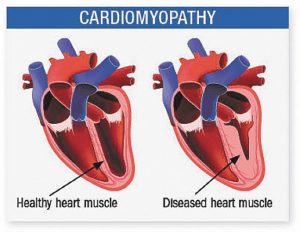By Dr. Aneley Yegezu Hundae, M.D., FACC
 Alcohol Awareness Month serves as a poignant reminder of the significant impact alcohol consumption can have on our health, particularly on the heart. Among the myriad of health concerns associated with excessive alcohol intake, alcohol-induced cardiomyopathy and holiday heart syndrome stand out as particularly concerning conditions. Understanding the intricacies of these conditions is essential for fostering awareness and promoting healthier choices.
Alcohol Awareness Month serves as a poignant reminder of the significant impact alcohol consumption can have on our health, particularly on the heart. Among the myriad of health concerns associated with excessive alcohol intake, alcohol-induced cardiomyopathy and holiday heart syndrome stand out as particularly concerning conditions. Understanding the intricacies of these conditions is essential for fostering awareness and promoting healthier choices.
Alcohol-induced cardiomyopathy is a condition characterized by the weakening of the heart muscle, leading to impaired heart function. Chronic and excessive alcohol consumption is the primary culprit behind this condition, as alcohol can directly damage heart muscle cells and interfere with the heart’s ability to pump blood effectively. Over time, this damage can progress, ultimately leading to heart failure—a serious and potentially life-threatening condition.
One of the insidious aspects of alcohol-induced cardiomyopathy is its silent progression. In the early stages, individuals may not experience any noticeable symptoms, allowing the condition to worsen unchecked. As the heart muscle weakens further, symptoms such as fatigue, shortness of breath, swelling in the legs, and irregular heartbeat (arrhythmia) may manifest. If left untreated, alcohol-induced cardiomyopathy can significantly reduce life expectancy and dramatically impact quality of life.
Holiday Heart Syndrome, a term coined in the late 1970s, refers to an acute form of arrhythmia typically seen in individuals who binge drink during holidays or other celebratory occasions. The hallmark of this syndrome is atrial fibrillation (Afib), a type of irregular heartbeat characterized by rapid and chaotic electrical activity in the heart’s upper chambers. While the exact mechanism underlying holiday heart syndrome is not fully understood, it is believed that excessive alcohol consumption can disrupt the heart’s electrical system, leading to the development of Afib.
Unlike alcohol-induced cardiomyopathy, holiday heart syndrome often presents suddenly and acutely. Individuals may experience palpitations, chest discomfort, dizziness, and shortness of breath—symptoms that can be alarming and frightening. While Afib associated with holiday heart syndrome is typically temporary and resolves once alcohol consumption ceases, repeated episodes can increase the risk of developing chronic Afib and other cardiovascular complications over time.
The link between alcohol and heart health is undeniable, yet it is a complex relationship influenced by various factors, including the amount and frequency of alcohol consumption, genetic predisposition, and overall lifestyle choices. While moderate alcohol consumption has been associated with certain cardiovascular benefits, such as a reduced risk of coronary artery disease, excessive or binge drinking can have detrimental effects on the heart and outweigh any potential benefits.
Promoting alcohol awareness involves educating individuals about the risks associated with alcohol consumption and empowering them to make informed decisions about their health. For individuals who choose to drink, moderation is key. The Centers for Disease Control and Prevention (CDC) defines moderate drinking as up to one drink per day for women and up to two drinks per day for men. It’s important to note that these guidelines are not a recommendation to start drinking if you do not already consume alcohol.
For those struggling with alcohol dependence or addiction, seeking professional help and support is crucial. Treatment options may include counseling, medication, support groups, and rehabilitation programs tailored to individual needs. By addressing the root causes of alcohol misuse and providing access to comprehensive care, individuals can take steps towards recovery and improved heart health.
Alcohol Awareness Month serves as an opportunity to shine a spotlight on the impact of alcohol on our health and well-being. By raising awareness about alcohol-induced cardiomyopathy, holiday heart syndrome, and other alcohol-related health concerns, we can foster a culture of moderation, responsibility, and informed decision-making. Together, we can work towards a healthier future for ourselves and our communities.
Dr. Aneley Yegezu Hundae, M.D., FACC invasive cardiology and advanced heart failure management Dr. Hundae received his Premedical and Doctor of Medicine Degree from Jimma University School of Medicine. He completed his Internal medicine Residency at Mercer University School of Medicine. His Heart Failure/Heart Transplant fellowship at the University of Miami Cardiovascular Fellowship Program. Cardiovascular fellowship at Baylor University Medical Center.
Board certifications
• Cardiology
• Advanced Heart Failure and Transplant
• Nuclear Cardiology
• Comprehensive Echocardiography
• Internal Medicine
3161 Harbor Blvd, Suite A, Port Charlotte, FL 33952
(941) 235-8892
www.portcharlottecardiology.com









